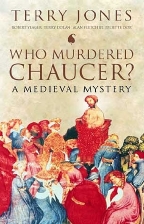Who Murdered Chaucer?
Terry Jones, Robert Yeager, Terry Dolan, Alan Fletcher, Juliette Dor
Methuen
UK Hardback First
ISBN: 0 413 75910 5
410 pages; £20.00
Date Reviewed: 2nd November 2003
Reviewed by: Serena Trowbridge © 2003

REFERENCES
COLUMNS
|
|
|
Who Murdered Chaucer?Terry Jones, Robert Yeager, Terry Dolan, Alan Fletcher, Juliette DorMethuenUK Hardback FirstISBN: 0 413 75910 5410 pages; £20.00Date Reviewed: 2nd November 2003Reviewed by: Serena Trowbridge © 2003 |
|
|
REFERENCES |
COLUMNS |
This book was conceived after Terry Jones and his collaborators decided to hold an inquest on Chaucer, in 1998, nearly 600 years after Chaucer's death. All those involved had an academic interest in Chaucer's work, but were curious to discover what had happened to the man himself, since he vanishes without trace in 1400, shortly after Henry IV's accession to the throne. Surely such a popular and lauded poet would have a well-attended and documented funeral, for example. But with Chaucer, his death is shrouded in mystery.
Those present at the inquest decided to write a chapter each; Terry Jones' proved so long and consuming that he decided to turn it into a book, and the others agreed that their work be subsumed into his. The result is Who Murdered Chaucer? A medieval mystery - or, as Jones puts it, "not so much a whodunit as a wasitdunatall?"
Chaucer has become a rather bland face of Englishness; everyone knows who he was though few actually read him. The general assumption seems to be that he was an ordinary man who wrote for the people, sometimes bawdy and sometimes serious. This, it turns out, couldn't be further from the truth. Jones' carefully constructed arguments paints a picture of Chaucer as a man of the court, living and writing among the gentry of the land, producing work that the king listened to as it was read aloud in court. Jones portrays Chaucer as "the intellectual superstar" of his day, who ended up as literally the victim of his own success. Not only this, but he was a trusted international spy, as well as holding many other offices including inspector of drains and ditches!
Following the current trend for revisionist history, which is influential in academic circles, Jones attempts to change the way the fourteenth century is perceived, examining the church and the state, theories and histories of entertainment. In order to understand Chaucer, he argues, it is necessary to understand the world in which he lived, and that world is portrayed with conviction and intelligence, making it accessible to the lay reader with little prior knowledge of Chaucer or his period, but no less relevant to those who know more about the subject. The international court of Richard II is well portrayed as a shift from the military court of Edward II, and the traditional images of these monarchs are shattered in a surprisingly convincing manner.
There are even touches of humor, including a Pythonesque glimpse of Chaucer's wife berating her husband for reading alone every night instead of keeping her company.
Chaucer's death, therefore, was engineered by the regime of a new king, Henry IV, keen to make a clean sweep and rewrite the history of the king he had usurped. Obviously this king's poet, who had chronicled the blossoming of literature in the age of Richard, would be one of the first to go. Not only that, but Chaucer had supported the use of everyday language for the religious texts of the time which, in a Catholic country where the priests under the direction of the Pope had a great deal of influence, was a very dangerous game indeed. He also mocks the faith, in a good-humored manner, which might not have been taken so lightly by the authorities.
Despite attempts to reinvent him as a man of our age, Chaucer was very much a man of his times, not just as a writer but also as a political figure in a period where politics were extremely dangerous. This is Chaucer in context, which is just what the modern reading public need. The modern parallels are useful and relevant in many ways, but this is a slice of good old-fashioned history, written in an entertaining and readable style. The wild assumptions that are cheerfully asserted at the start of this book are convincingly and intelligently supported, and even if there is no body and no proof, the whodunit is concluded in a way that few will question, and those who wish to argue will have a lot of material to go on, and debates such are these are in the best academic tradition and will only serve to further inspire the current fascination with Chaucer's life and work.